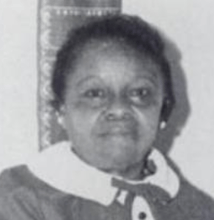L. Zenobia Coleman facts for kids
Louie Zenobia Coleman (born January 21, 1898 – died May 3, 1999) was an American librarian. She spent most of her career at Tougaloo College in Mississippi. People remember her for "paving the way for future black librarians." She even received a special lifelong membership from the American Library Association. The L. Zenobia Coleman library at Tougaloo College is named in her honor.
Contents
About Louie Zenobia Coleman
Louie Zenobia Coleman was born in Childersburg, Alabama. Her birthday was January 21, 1898. Her parents were farmers. She went to Talladega College and earned a degree in Education in 1921. Later, she studied education at the University of Chicago in the 1920s.
Her Early Career
Coleman began her career at Brick Junior College in North Carolina. She worked there as a librarian and teacher from 1924 to 1932. She then went to Columbia University to study library science. She earned her first library science degree in 1936. In 1943, she received her Master's degree in Library Science, also from Columbia.
Working at Tougaloo College
In 1933, Coleman became a librarian at Tougaloo College in Tougaloo, Mississippi. She worked there for 36 years until she retired. During this time, Jim Crow laws and racism made things very difficult for Black librarians. They often faced unfair rules. For example, they could only use service entrances at meetings. They were not allowed to attend social events.
Despite these challenges, Louie Zenobia Coleman kept working hard. Her strong efforts helped open doors for many Black librarians who came after her. She showed great courage and helped change things for the better.
Challenging Segregation
One story shows how people like Coleman bravely faced unfair rules. A white faculty member from Tougaloo, Clarice Campbell, once invited Coleman and another Black librarian, Julia Bender, to a church meeting. Even though the church was supposed to be open to everyone, they were pushed away from the door.
Ms. Campbell spoke to the pastor, who made sure they were welcomed. This event showed how people were working to end segregation. It was a small but important step in breaking down barriers.
Helping Other Colleges
While at Tougaloo, Coleman also helped other colleges. She assisted with organizing books at Alabama State University. She taught at Southern University in Baton Rouge, Louisiana. She also visited North Carolina Central University as a librarian.
Coleman wrote articles for library and education magazines. She joined many library groups and advisory boards. She also started a local chapter for Alpha Kappa Alpha, a sorority. In 1973, she was made a "Continuing Member for life" of the American Library Association. This was a great honor.
Her Lasting Legacy
A new library was built at Tougaloo College in the 1970s. It was named the L. Zenobia Coleman library in her honor. When she learned about this, Coleman started a special fund to support the library. After she retired, she continued to live in Tougaloo. She passed away on May 3, 1999. Her work continues to inspire many people today.
 | Emma Amos |
 | Edward Mitchell Bannister |
 | Larry D. Alexander |
 | Ernie Barnes |


